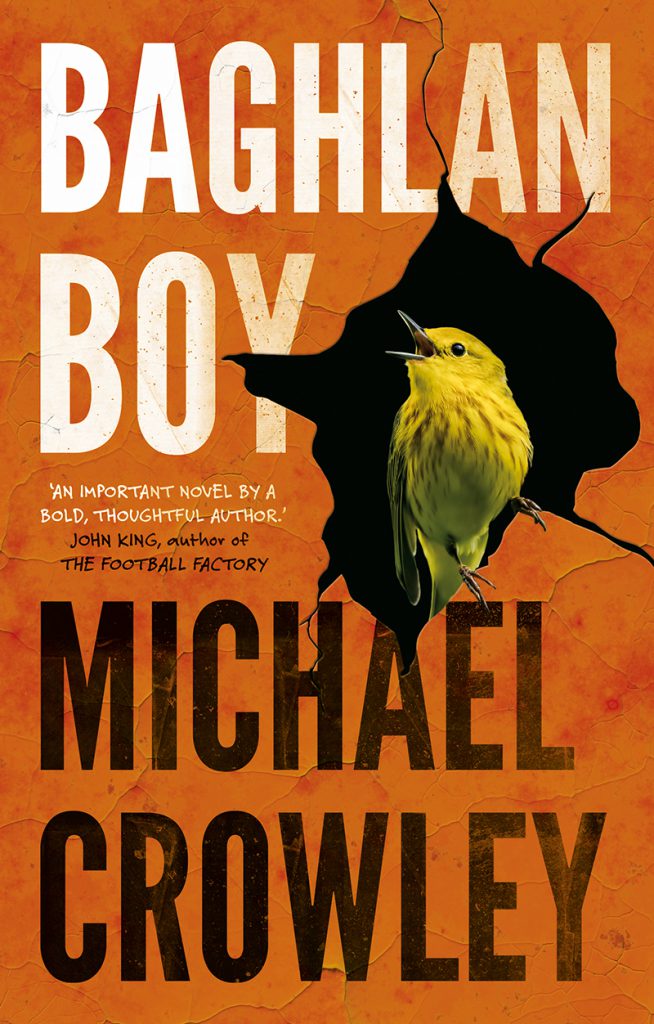
Farood Abdali is eleven when a drone strike destroys his family’s mud-built home in Baghlan Province, Afghanistan, killing his father and leaving him and his older brother alone. His brother sells the family sheep to pay an ‘agent’ to take Farood to the West, hoping he’ll return with liberating wealth one day. Farood’s journey is one of pain and endurance across Pakistan, Iran, and Turkey, in the boots of cars at border crossings and waiting with others in basements and trailers. We skip forward eight years to a prison where nineteen-year-old Farood is beginning a life sentence for a crime he says he didn’t commit. He can fight better than most, but it’s not easy negotiating a way through hierarchies and alliances on the wing. Forever a captive, despite his will to escape, can Farood Abdali break the mould and forge a better life? Baghlan Boy is published by The Book Guild.
“Written with great compassion and insight, Baghlan Boy takes us to the margins and beyond. Despite its roots in the tragedies of war and exploitation, this is ultimately a story of optimism, unity, and justice. An important novel by a bold, thoughtful author.” John King, author of The Football Factory.
Through the trials and sometimes brutal tribulations of a young Afghan migrant, Baghlan Boy provides a geopolitical tragedy with all-too-human dimensions. It is a remarkable achievement. Crowley convincingly and dramatically renders every stage of his young protagonist’s journey, from the war-torn steppes of his childhood, through the smuggled transit and treason of his migration, to the Lancashire prison of his adulthood, and he does so in a narrative that is never less than compelling. Tim Black, Spiked online

Launch of Baghlan Boy at Hebden Bridge Town Hall, September 2021. Photo Bruce Cutts.

The Stony Ground is the story of Cornish farmworker James Ruse, reprieved from the hangman’s noose and transported to Botany Bay on the First Fleet in 1788. Ruse, commemorated as a pioneer in his adopted country, was reputedly the first prisoner ashore, carrying an officer on his back. Eventually pardoned, at Experiment Farm he became Australia’s first settled farmer, the first ex-convict to be granted land and the first settler to become self-sufficient, bringing him into conflict with indigenous people. In this gripping historical novel, the life of Australia’s most symbolic convict is described in Ruse’s own voice.
“Highly acclaimed” Helen Dale, The Australian.
“A highly original narrative of exile and survival from rural England to New South Wales and the Tasman Sea filling a gap in the literature of transportation and dramatising a key period in British penal history.”

With the descendants of James Ruse at Experiment Farm Cottage, New South Wales 
Hawkesbury Museum, New South Wales

What’s a fair punishment for stealing a watch?
It’s 1788, and Jacob Jones has been sentenced to seven years’ labour in Australia. The work is hot, hard and dangerous. Will Jacob find a way to escape? Or is there nowhere to run?
For Diffusion Books as part of their prison reading series.
This book is particularly suitable for adults who want to improve their reading skills. It includes ‘What do you think?’ questions at the end of each chapter
The Rip Tide was longlisted for the Aurora Short story Prize 2021.
Nemesis
A short story published in Under the Fable
Jack had grown up with bushfires. So had the town. Bush nudged up against the little country town in New South Wales on three sides. To the north, there was a cliff of rock with eucalyptus trees teetering along the edge and poking out of the face, that if ever on fire, would fall on the tin roof of the library below like burning spears. As a boy, Jack had regularly ridden his bike into the bush as far as Dunn’s Swamp and once or twice, he had stamped out the embryo of a fire on a dry spring afternoon. When he was older, he sometimes climbed to the top of the escarpment and looked to the east for plumes of smoke. There was even a watch tower on the edge of town that was manned by the volunteer fire service, pretty much dawn to dusk during the spring and early summer. Jack never made the fire service full-time, but to his credit he became a volunteer, regularly giving up weekends. He planned someday to apply again. Most of his days though were spent in the town’s cement plant. A place of grey powder inside and out that spilt onto the road and then the edges of the bush and never left his hands.
Jack lived with Sylvie in a pale green wooden bungalow at the bottom of his father’s garden. The exterior paintwork had been rinsed out by the weather and they hadn’t yet got around to discussing colours for the interior. Jack’s grandmother had lived there for her last ten years and her presence clung on to their lives. The garden was two tennis courts length of stubble. At the other end was Jack’s father, more often in than out and most likely drinking afternoon. In the other direction were the fence and then a peppermint grove that if the breeze was right, helped them to sleep on a summer’s night. Sylvia’s family were disappointed with their daughter’s choice of home and companion, they had expected her to be at university by now not looking into fields listening to Jack’s stories about stealing from orchards as a boy. They weren’t from the town, they were from the Sydney suburbs and had made the move when her father’s internet business took off. Sylvia settled in quickly though, had made friends and been in the Railway Hotel and friend’s houses, had begun to change the way she spoke and the clothes she wore to something less particular, had met Jack and become Sylvie.
Read the rest of the story here